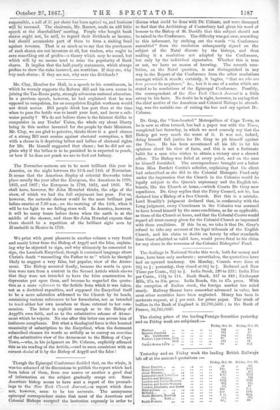Though the Episcopal Conference decided that, on the whole, it
was too ashamed of its discussions to publish the report which had been taken of them, from one source or another a good deal -of information on the subject gradually creeps out. Some American bishop seems to have sent a report of the proceed- ings to the New York Church Journal,—a report which does not, however, seem to be too accurate. The anonymous episcopal correspondent states that most of the American and Colonial Bishops accepted the invitation expressly in order to discuss what -e-Ould b Zone-iv-A 11 Dr. Colenso, and were dismayed to find that the Archbishop of Canterbury had given his word of honour to the Bishop of St. David's that this subject should not be raised in the Conference. The difficulty was got over, according to this informant, by striking out the words "in Conference assembled" from the resolution subsequently signed on the subject of the Natal diocese by the bishops, and thus making it a resolution not adopted by the Conference, but only by the individual signataries. Whether this is true or not, we have no means of knowing. The seventh reso- lution, on the Natal question, is not distinguished in any way in the Report of the Conference from the other resolutions amongst which it stands ; certainly, it begins, "that we who are here present do acquiesce," &c., but it is one of a series which are stated to be resolutions of the Episcopal Conference. Possibly, the correspondent of the New York Church Journal is a little astray in his facts. No doubt he is right, however, in saying that the chief motive of the American and Colonial Bishops in attend- ing, was the amiable one of raising the hue and cry against De. Colenso.


































 Previous page
Previous page